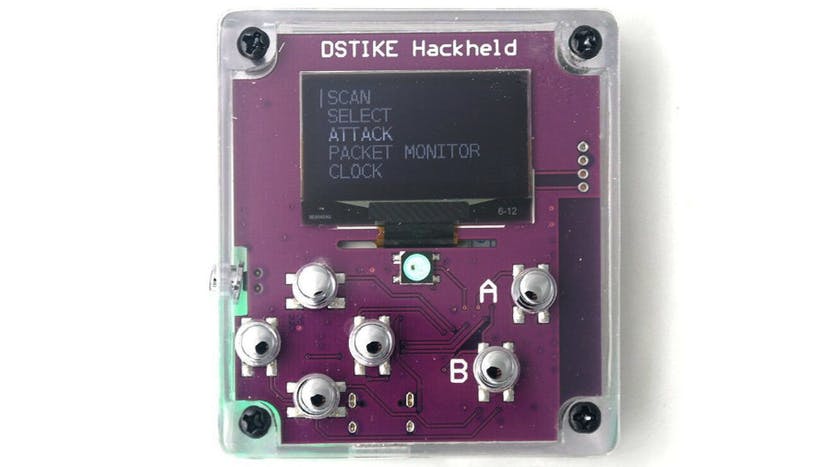
Travis Lin's DSTIKE Hackheld Is an Open Source, Pocket-Friendly Tool for Wi-Fi Network Analysis
from hackster.io
Security researcher Travis Lin, working with pseudonymous colleague Spacehuhn, has released an open source pocket-size tool for 2.4GHz Wi-Fi security analysis as part of the growing DSTIKE family of devices: The DSTIKE Hackheld.
"Hackheld is a open source hackable handheld for DIY," Lin explains of his latest device, which joins a family of microcontroller-based Wi-Fi security tools including a series of units in a chunky wristwatch form-factor. "It comes installed with the latest ESP8266 Deauther software. With this software, you can perform different attacks to test Wi-Fi networks."
The DSTIKE Hackheld isn't an entirely original creation of Lin's, though: "I designed this development board especially for Spacehuhn's great project, Hackheld," Lin explains. "It has been authorized by him and is officially supported."
The DSTIKE variant of the Hackheld project includes the board itself with an ESP8266 microcontroller, a 1.3" OLED display, a WS2812b addressable RGB LED linked to a GPIO pin and with quick-access "flashlight" mode, a four-way direction pad and two buttons, along with a 1Ah battery offering a 10-hour runtime between charges, a USB Type-C connector for power and data, a four-level battery meter, a soft power switch, an acrylic cover, and a 3D-printed transparent housing.
Running the ESP8266 Deauther firmware, the unit's capable of four key attacks against Wi-Fi networks: A standard deauther attack to disconnect devices from a Wi-Fi network; a deauther beacon attack to create fake networks; a deauther probe to confuse Wi-Fi tracking systems; and a packet monitor, to display live traffic on the network.The DSTIKE Hackheld isn't an entirely original creation of Lin's, though: "I designed this development board especially for Spacehuhn's great project, Hackheld," Lin explains. "It has been authorized by him and is officially supported."
The DSTIKE variant of the Hackheld project includes the board itself with an ESP8266 microcontroller, a 1.3" OLED display, a WS2812b addressable RGB LED linked to a GPIO pin and with quick-access "flashlight" mode, a four-way direction pad and two buttons, along with a 1Ah battery offering a 10-hour runtime between charges, a USB Type-C connector for power and data, a four-level battery meter, a soft power switch, an acrylic cover, and a 3D-printed transparent housing.
Running the ESP8266 Deauther firmware, the unit's capable of four key attacks against Wi-Fi networks: A standard deauther attack to disconnect devices from a Wi-Fi network; a deauther beacon attack to create fake networks; a deauther probe to confuse Wi-Fi tracking systems; and a packet monitor, to display live traffic on the network.
"This project is a proof of concept for testing and educational purposes. Neither the ESP8266, nor its SDK was meant or built for such purposes. Bugs can occur," Lin warns. "Use it only against your own networks and devices! Please check the legal regulations in your country before using it. We don't take any responsibility for what you do with this program."
Pre-assembled DSTIKE Hackheld units are available to order on Lin's Tindie store now at $55 each; more information on the Hackheld project itself can be found on Spacehuhn's GitHub repository.




Leave a comment